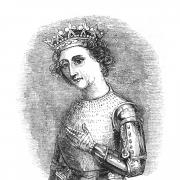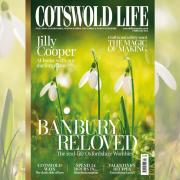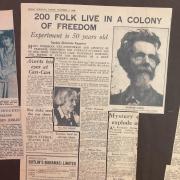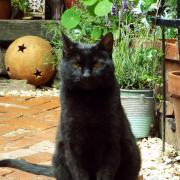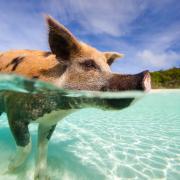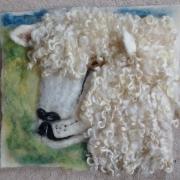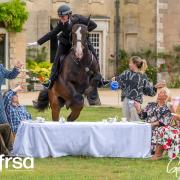with BBC Radio Gloucestershire’s Mark Cummings
Solid as oak
It’s a bit disconcerting co-hosting a show when the person opposite looks like a Greek god. That’s what happens when you invite Gloucester Rugby’s Billy Twelvetrees to enter your studio in his shorts and tight training top, blonde surfer dude hair and disarmingly charming smile.
Billy joined my show a few days before his testimonial and we had an absolute riot. The phone lines were rammed with fans wanting to congratulate him on his service to the club, his hair, his ten years of loyalty, the work he does in the community, his hair, his goal kicking, the help he gives to the young players, and also his hair. His most treasured memory was winning the Challenge Cup at The Stoop against Edinburgh. Whilst we fans were having a party on the way home at Reading Services, the team went on a three-day bender with the trophy. Thinking it was a replica, it was thrown around amongst the players and ended up battered and bruised... it wasn’t a replica.
His funniest moment came when, in the last minute away to Wasps with the team winning by a point, all he had to do was to kick the penalty into touch, win the line out and the game was won. However, the kicking tee had been brought onto the pitch which means you have to go for goal. From a very long way out he converted!
In preparation for his visit, my listeners had drawn up a list of their favourite trees, including on May Hill, Cirencester’s yew hedge, the 99 trees in Painswick churchyard and many others. From a short list of 12, Billy chose an ancient oak on Hucclecote Green. To sum him up, his testimonial raised thousands for local charities, including research into MND for his great friend Ed Slater who Billy joined on his epic bike ride in the summer.

Half a mile of madness
Guess where we are in the Cotswolds? It stretches for 2,640 feet, provides a place for gastronomic gluttony, classic English summer sports, sheep racing and the choice of a pub at either end. I’m alluding to the magnificent green at Frampton on Severn, the longest village green in the country.
I was sharing my anecdotes about this dreamy location with my listeners and soon realised how much it means to so many. The green is known as Rosamund’s Green after Henry II’s mistress, Rosamund Clifford, a member of the family closely associated with Frampton from the 11th century. I heard stories of elver-eating competitions, the Frampton Feast – which back in the day included huge amounts of food, cider and bare-knuckle boxing. They have sheep racing on the green, and of course that wonderful sight in the summer of a quintessential game of cricket.
I’d always dreamed of playing in one of these games and the dream came true about 15 years ago when Frampton agreed to a charity match with BBC Radio Gloucestershire. Whilst fielding at slip, I broke a rib with a rather clumsy dive, but manfully opened the batting a few minutes later. This might explain my shameful three-ball duck.
A couple of months later I was back falling off an electric scooter whilst filming for BBC Points West. A year later I ended up in Tetbury hospital after tearing my calf at the tennis club just off the Green. Despite all this, I absolutely love the place.

Bend over, Cummings
The word “Dap” in old Cotswold means bounce. ‘We used to dap the ball against the wall.’ This featured in my Cummings County Quiz, and I was reminded that many use the word “Dap” for shoe/plimsole.
The conversation quickly moved onto the painful subject of “getting the dap”. My twenty-something colleagues were genuinely astonished at the tales we told of getting a beating at school. I got the cane from Mr Ackroyd (‘Wackroyd’) for not wearing my school tie, and he beat me with six brutal strokes that stung my bony little bottom for days. Chris from Prestbury recalled in the late 50s his biology teacher would use a large cow’s thigh bone to whack you, whilst the PE teacher would swing a cricket bat over his shoulder and smack you on the backside.
There was a theme of teachers using something related to their subject matter to inflict pain. Julia in Tuffley had a sadistic RE teacher who used a heavy old blue Bible as a torture weapon, and Peter in Stroud mentioned a science teacher who did all sorts with a Bunsen burner!
READ MORE: Mark Cummings remembers Mike Lowe.

County cures
If you print a story about baking an owl as a cure for consuming too much port there is a decent probability it’ll get a few hits. This happened recently when it was revealed powdered baked owl helped with the agony of gout.
Did you know, however, about the following local cures?
- Grease from the church bells at Oxenton and Winchcombe was commonly applied in treatment for shingles
- A child with rickets in Minchinhampton would be passed through a hole in the Longstone
- In Gretton, whooping cough was treated by passing the afflicted over a prickly hedge three times
- At Upton St Leonards, to rid yourself of warts, you’d simply find a black snail and prick it as many times as there were warts then hang it from a bush.
- It was a bit more civilised in Nailsworth, where to get rid of warts you’d rub them with bacon!
Email: cummings@bbc.co.uk




